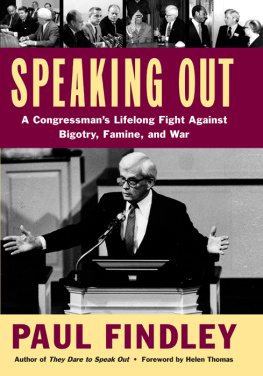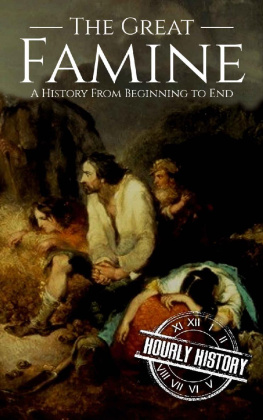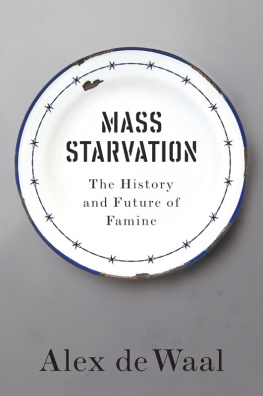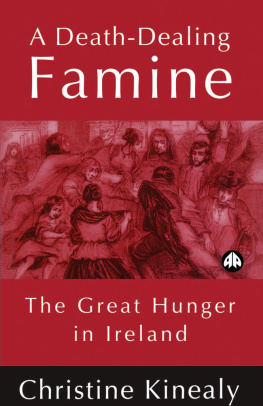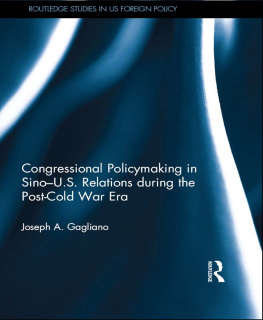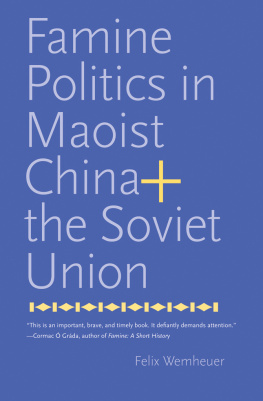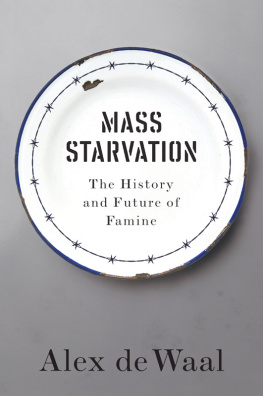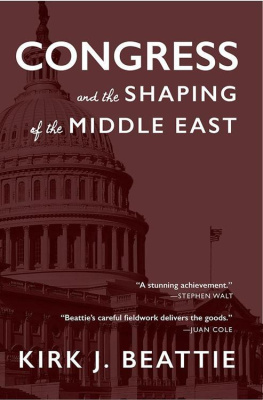Advance Praise

Paul Findleys fascinating life story ends with a wakeup warning: Our governments subservience to Israel is costing America dearly.
former Senator James Abourezk
Paul Findleys Speaking Out crisply records the extraordinary life of a central Illinois journalist turned congressman. It is a valuable reminder of a politics where reason reigned. Its message and Findleys example were never more timely.
former Senator Adlai E. Stevenson III
His lifetime of courage, integrity, and principles shines throughout this book. It is a terrible tragedy and a great loss for the citizens of Illinois and the people of the United States of America that his stellar career of public service was cut short by a ruthless and unprincipled domestic Fifth Column operating at the behest of a criminal foreign state. Paul shall always remain one of my personal heroes. After reading this book, he will become one of your heroes too.
Professor Francis A. Boyle, University of Illinois College of Law
Hopefully Speaking Out will inspire some of the best of todays young idealists to serve the country in the cause of world peace through world law rather than warfare.
former Congressman Paul Pete McCloskey
Powerful lobby forces conspired to force him out of an influential career in Congress, only to have him surface again as a bestselling author and political activist, still fighting for justice and peace in the Middle East. In the words of Harvard professor Stephen Walt, Paul Findley was there first.
James M. Wall, former editor, Christian Century magazine

Library of Congress Cataloging-in-Publication Data
Findley, Paul, 1921
Speaking out : a Congressmans lifelong fight against bigotry, famine, and war/Paul Findley ; foreword by Helen Thomas.
p. cm.
Includes bibliographical references and index. ISBN 978-1-56976-625-5 (hardcover)
1. Findley, Paul, 19212. Findley, Paul, 1921Political and social views. 3. United StatesPolitics and government19451989. 4. United StatesPolitics and government19895. LegislatorsUnited StatesBiography. 6. United States. Congress. HouseBiography. I. Title.
E840.8.F56A3 2011
328.73092dc22
[B]
2010053899
Interior design: Sarah Olson
2011 by Paul Findley
Foreword 2011 by Helen Thomas
All rights reserved
Published by Lawrence Hill Books, an imprint of
Chicago Review Press, Incorporated
814 North Franklin Street
Chicago, Illinois 60610
ISBN 978-1-56976-625-5
Printed in the United States of America
5 4 3 2 1
Foreword

HELEN THOMAS
Former Dean of White House Correspondents
T his book by former Representative Paul Findley, an Illinois Republican, is a revealing and fascinating autobiography of a twenty-two-year veteran on Capitol Hill who called them as he saw thema true profile in courage.
Findley was one of the few members of Congress who had the audacity to meet with the late Palestinian leader Yasser Arafat and express his sympathy for the plight of the Palestinians and dismay at the help given by the United States to scofflaw Israel [to] destroy an entire nationality.
In Speaking Out, the author takes issue with the U.S. government trying to police the world and urges a multinational federation strong enough to enforce world law. He reminds President Obama of President Eisenhowers warning against the danger of the military industrial complex and recommends a sharp cut in the defense budget. He writes that since Obama took office there are disturbing signs that he is surrounded by generals [and] has been misled into the illusion that violent insurgents can be defeated by bombs and missiles. Instead of halting U.S. combat operations, he brandishes new swords and calls for victory in Afghanistan.
Findley predicts: Insurgent violence would quickly diminish if our leaders halted all U.S. combat operations and terminated our complicity in Israels abuse of Arabs. He notes, History demonstrates that suicide bombings occur almost entirely in countries like Iraq and Afghanistan where foreign troops hold the upper hand.
It is Findleys second book that takes a big whack at the Israeli lobbys power in Americas foreign policy centersin the White House and Congress. It follows his remarkable breakthrough treatise, They Dare to Speak Out: People and Institutions Confront Israels Lobby. He discloses how untouchable Israel became, even after it attempted to destroy the USS Liberty, a U.S. intelligence ship, and its crew during the Six-Day War between the Israelis and Arabs in 1967. He adds that President Lyndon B. Johnson, by issuing orders calling off a navy rescue mission and imposing a tight cover-up of Israels guilt, ignored murder and sanctioned perfidy, malfeasance, and deceit. He asserts that Israel repeatedly violates the Arms Export Control Act that prohibits use of U.S.-supplied weapons beyond legitimate self-defense.
A series of episodes convinced him that goodwill for Palestinian human rights never existed among Israeli administration officials at any time during the Jewish states half-century history. They did not want good faith negotiations. Instead, he writes, Israelis wanted to prolong talks indefinitely while they expanded their settlements to overrun and obliterate occupied Palestine. When Findley urged support for a homeland for Palestinians in a White House exchange with Ronald Reagan, the president responded astoundingly: But where would they go? You could not find anyone more pro-Israel than Reagan.
In light of Americas subservience to Israel, Findley sees little hope that Washington will soon force Israel to agree to a viable independent Palestine. While not holding his breath, he believes the only hope for early peace in the Holy Land lies in resolute leadership by wise citizens within Israel and Palestine inspired by South Africas recent termination of apartheid. If white Afrikaners and black Zulus can be brought together in equal political standing, Israeli Semites and Palestinian Semites can find a similar, useful, and durable accord. To do this, both sides should take control of public policy and organize a mutual program of confession, forgiveness, and reconciliation.
Findley began his political career as a congressman in 1961, focusing on the agricultural problems of his constituency in rural Illinois. But his position as ranking Republican member of the Middle East Subcommittee of the House Foreign Affairs Committee was an eye-opener to the global picture and U.S. involvement. He soon learned that it would cost him to have an independent view and take the path least taken to find out for himself, despite the propaganda onslaught against a free thinker on Capitol Hill who shunned the party line. Findley became a major target for the American Zionists, who succeeded in defeating him in 1982.
He writes, The time has come for plain talk and clear-headed action. Our society pays a terrible price for policies that magnify and multiply religious bias and acts of war. We must liberate ourselves from fear of Israel and its partisans, and retrace our steps to moral high ground where America belongs.
Findleys brave and unfortunately almost unique political stand for an American politiciandespite the slings and arrows he sustains, even death threatswere worth it as he reflects on his efforts to weigh in on worthy causes on Capitol Hill.

